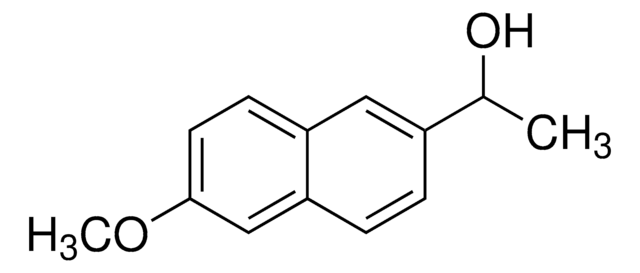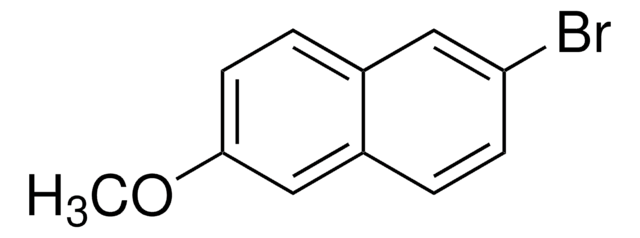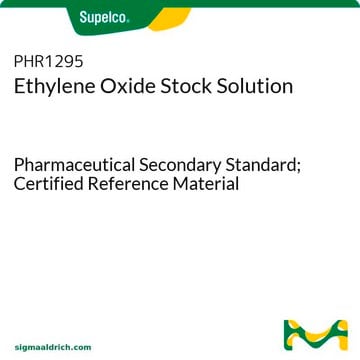82320
(±)-Propylene oxide
puriss. p.a., ≥99.5% (GC)
Synonym(s):
(±)-Methyloxirane, 1,2-Epoxypropane
About This Item
Recommended Products
vapor density
2 (vs air)
vapor pressure
29.43 psi ( 55 °C)
8.59 psi ( 20 °C)
grade
puriss. p.a.
Assay
≥99.5% (GC)
form
liquid
autoignition temp.
1378 °F
expl. lim.
37 %
impurities
≤0.1% water
evapn. residue
≤0.005%
refractive index
n20/D 1.366 (lit.)
n20/D 1.366
bp
34 °C (lit.)
mp
−112 °C (lit.)
density
0.83 g/mL at 25 °C (lit.)
cation traces
Al: ≤0.5 mg/kg
Ba: ≤0.1 mg/kg
Bi: ≤0.1 mg/kg
Ca: ≤0.5 mg/kg
Cd: ≤0.05 mg/kg
Co: ≤0.02 mg/kg
Cr: ≤0.02 mg/kg
Cu: ≤0.02 mg/kg
Fe: ≤0.1 mg/kg
K: ≤0.5 mg/kg
Li: ≤0.1 mg/kg
Mg: ≤0.1 mg/kg
Mn: ≤0.02 mg/kg
Mo: ≤0.1 mg/kg
Na: ≤0.5 mg/kg
Ni: ≤0.02 mg/kg
Pb: ≤0.1 mg/kg
Sr: ≤0.1 mg/kg
Zn: ≤0.1 mg/kg
shipped in
wet ice
storage temp.
2-8°C
SMILES string
CC1CO1
InChI
1S/C3H6O/c1-3-2-4-3/h3H,2H2,1H3
InChI key
GOOHAUXETOMSMM-UHFFFAOYSA-N
Looking for similar products? Visit Product Comparison Guide
Related Categories
General description
Application
- Poly(3-hydroxybutyrate), a biodegradable and biocompatible polyester, by carbonylative polymerization.
- Poly (propylene-ram-ε-caprolactone carbonate) (PPCL) and poly (propylene carbonate) (PPC), which are applicable as drug carriers.
Signal Word
Danger
Hazard Statements
Precautionary Statements
Hazard Classifications
Acute Tox. 3 Dermal - Acute Tox. 3 Inhalation - Acute Tox. 4 Oral - Carc. 1B - Eye Irrit. 2 - Flam. Liq. 1 - Muta. 1B - STOT SE 3
Target Organs
Respiratory system
Storage Class Code
3 - Flammable liquids
WGK
WGK 3
Flash Point(F)
-36.4 °F - Equilibrium method
Flash Point(C)
-38 °C - Equilibrium method
Personal Protective Equipment
Certificates of Analysis (COA)
Search for Certificates of Analysis (COA) by entering the products Lot/Batch Number. Lot and Batch Numbers can be found on a product’s label following the words ‘Lot’ or ‘Batch’.
Already Own This Product?
Find documentation for the products that you have recently purchased in the Document Library.
Our team of scientists has experience in all areas of research including Life Science, Material Science, Chemical Synthesis, Chromatography, Analytical and many others.
Contact Technical Service









